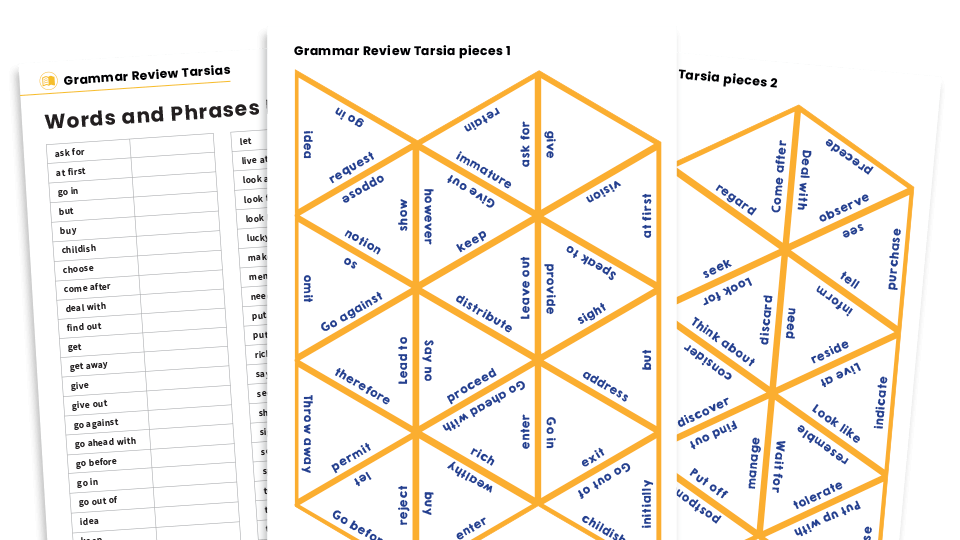Add inspiration and fun to your English lessons with a simple yet addictive tarsia puzzle that relates to literacy…
Whether you’re a teacher or a parent or even both (how do you manage that?), there are certain things you look for in any activity that you are aiming to set for your little darlings.
Top of the list must be questions such as 'will they enjoy it?' and 'will it keep them happily engaged for a decent amount of time?'.
You will understand this particularly well if you have searched for toys or games and been taken in by a blurb that boasts “hours of fun”. Then when you got it home, you discovered that the entertainment just about slipped into the second hour and 58 of the preceding minutes had involved you struggling to set it up.
So, we will make no extravagant claims here. However, we would like to share with you a few resources we have created to help pupils with everything from identifying rhymes to embedding grammar terminology. They’re simple and engaging – they’re tarsia puzzles.
If you already use them, you’ll know that children love them. If they’re new to you, you’re in for a treat.
What is a tarsia puzzle?
A tarsia puzzle is a sort of jigsaw puzzle that is both remarkably simple and addictively challenging at the same time.
Instead of fitting little irregular shapes into each other, players have to match up pieces of information written on sides of triangles with corresponding information on other triangles.
Do it right and it all builds into a larger, recognisable shape. Make a mistake and you end up with goodness knows what.
How do they boost learning?
The value of a tarsia puzzle for teachers is that it's a really fun way of letting your pupils know that they have securely grasped a topic. This is because they will only be able to complete it if they have got all the answers.
What’s more, they are pretty simple and cheap to set up, especially if you use pre-designed examples like the ones we offer.
Above all, they are a great independent activity that can keep pupils absorbed either in the classroom or as homework.
Tarsia puzzles for English lessons
Rhyming words tarsia puzzle
A good example of how tarsia puzzles can work as grammar games is our resource for rhyming words.
As fans of certain genres of music will know, finding a good rhyme is not as straightforward a skill as you might imagine.
At least you’ll be giving your class the chance to gain early confidence in this field with this tarsia puzzle in which they have to match sides of triangles where the words rhyme. If they get it right, it will build into a larger equilateral triangle.

Verb synonyms tarsia puzzle
One of the most important requirements of any writer is the ability to write with a rich and varied vocabulary. Not only does this avoid tedious repetition, but it also prompts you to consider whether you have used the best possible word for the context.
Since we are not born with a thesaurus in our heads, this ability has to be exercised and nurtured. A tarsia puzzle provides the perfect mental workout.
See how your class gets on with our tarsia puzzle where you have to match up synonyms for a range of verbs. No doubt they’ll feel very good about themselves when they achieve/accomplish a correctly completed puzzle.

Grammar revision tarsia puzzle
If you want a fun way to revise grammar (and, frankly, who wouldn’t?) we have a brilliant tarsia puzzle in which pupils have to match grammar terms with model sentences that correctly illustrate them.
Prepositional phrase? I saw it on that triangle, there. As a bonus, you also get a version with the grammar terms but blanks where the model sentences should be so that pupils can write their own.
That way, they can both show that they really understand and create another puzzle with which to challenge their classmates.

Informal and formal language problem-solving
Using an appropriate degree of formality can be a challenge, even for adults, but we even have a tarsia puzzle to help pupils with that too.
By getting them to match informal terms with their more formal equivalents, you can enable them to show/indicate how well they understand this area, making it another important addition to your collection of grammar games.

Tarsia puzzle maker
As we suggested with our grammar revision tarsia puzzle, getting pupils to create their own versions of tarsias is a great extension activity. That's why we've included a blank tarsia puzzle template with all of these resources.
Of course, you can apply the tarsia approach to any subject you like, but here at Plazoom we are most interested in helping you to add even more inspiration and fun to your English lessons.
Now you know how to make a tarsia puzzle that relates to literacy, it should help you to ensure that many of the building bricks of our language will fall neatly into place for your pupils.
Sue Drury qualified as a primary teacher in 1999. Teaching pupils from Year 1 to Year 8, she has held a variety of positions including maths and English subject leader, year leader, and assistant headteacher. Sue has mentored students and NQTs, offering guidance and advice using her years of experience. She created many of Plazoom's literacy resources.